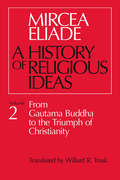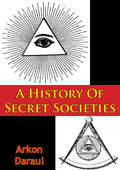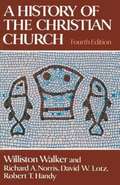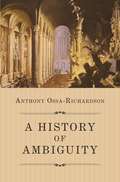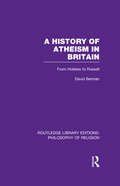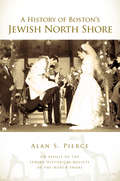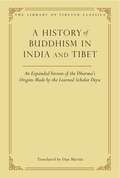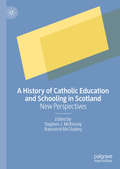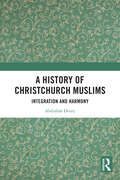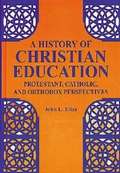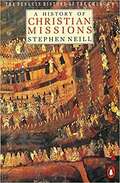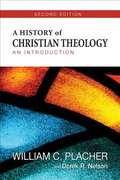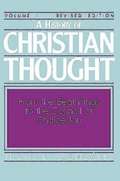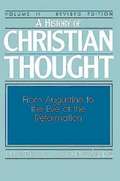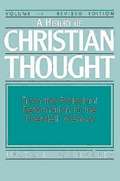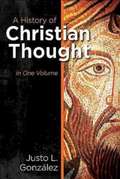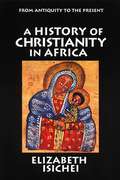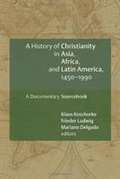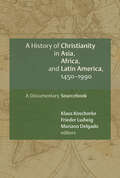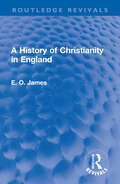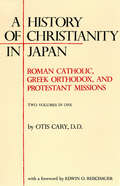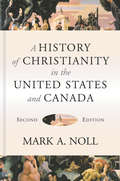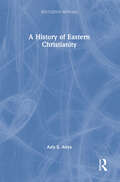- Table View
- List View
A History Of Religious Ideas: From Gautama Buddha to the Triumph of Christianity
by Mircea EliadeIn volume 2 of this monumental work, Mircea Eliade continues his magisterial progress through the history of religious ideas. The religions of ancient China, Brahmanism and Hinduism, Buddha and his contemporaries, Roman religion, Celtic and German religions, Judaism, the Hellenistic period, the Iranian syntheses, and the birth of Christianity—all are encompassed in this volume.
A History Of Secret Societies
by Arkon DaraulAlmost every social system throughout history has produced its secret societies. Here is a unique study of such societies from earliest recorded times to the present, along with an analysis of their forms, rituals, and beliefs. The author has traveled extensively to gather documentation. The Charcoal Burners of Italy, the Castrators of Russia, the Old Man of the Mountains, and the Gnostics are but a few of the many described.
A History Of The Christian Church (Fourth Edition)
by Robert T. Handy Williston Walker Richard A. Norris David W. LotzSince publication of the first edition in 1918, A History of the Christian Church by Williston Walker has enjoyed outstanding success and recognition as a classic in the field. Written by an eminent theologian, it combines in its narrative a rare blend of clarity, unity, and balance. In light of significant advances in scholarship in recent years, extensive revisions have been made to this fourth edition. Three scholars from Union Theological Seminary in New York have incorporated new historical discoveries and provided fresh interpretations of various periods in church history from the first century to the twentieth. The result is a thoroughly updated history which preserves the tenor and structure of Walker's original, unparalleled text.
A History of Ambiguity
by Anthony Ossa-RichardsonEver since it was first published in 1930, William Empson’s Seven Types of Ambiguity has been perceived as a milestone in literary criticism—far from being an impediment to communication, ambiguity now seemed an index of poetic richness and expressive power. Little, however, has been written on the broader trajectory of Western thought about ambiguity before Empson; as a result, the nature of his innovation has been poorly understood.A History of Ambiguity remedies this omission. Starting with classical grammar and rhetoric, and moving on to moral theology, law, biblical exegesis, German philosophy, and literary criticism, Anthony Ossa-Richardson explores the many ways in which readers and theorists posited, denied, conceptualised, and argued over the existence of multiple meanings in texts between antiquity and the twentieth century. This process took on a variety of interconnected forms, from the Renaissance delight in the ‘elegance’ of ambiguities in Horace, through the extraordinary Catholic claim that Scripture could contain multiple literal—and not just allegorical—senses, to the theory of dramatic irony developed in the nineteenth century, a theory intertwined with discoveries of the double meanings in Greek tragedy. Such narratives are not merely of antiquarian interest: rather, they provide an insight into the foundations of modern criticism, revealing deep resonances between acts of interpretation in disparate eras and contexts. A History of Ambiguity lays bare the long tradition of efforts to liberate language, and even a poet’s intention, from the strictures of a single meaning.
A History of Arabic Astronomy
by George SalibaA History of Arabic Astronomy is a comprehensive survey of Arabic planetary theories from the eleventh century to the fifteenth century based on recent manuscript discoveries. George Saliba argues that the medieval period, often called a period of decline in Islamic intellectual history, was scientifically speaking, a very productive period in which astronomical theories of the highest order were produced.Based on the most recent manuscript discoveries, this book broadly surveys developments in Arabic planetary theories from the eleventh century to the fifteenth. Taken together, the primary texts and essays assembled in this book reverse traditional beliefs about the rise and fall of Arabic science, demonstrating how the traditional "age of decline" in Arabic science was indeed a "Golden Age" as far as astronomy was concerned.Some of the techniques and mathematical theorems developed during this period were identical to those which were employed by Copernicus in developing his own non-Ptolemaic astronomy. Significantly, this volume will shed much-needed light on the conditions under which such theories were developed in medieval Islam. It clearly demonstrates the distinction that was drawn between astronomical activities and astrological ones, and reveals, contrary to common perceptions about medieval Islam, the accommodation that was obviously reached between religion and astronomy, and the degree to which astronomical planetary theories were supported, and at times even financed, by the religious community itself. This in stark contrast to the systematic attacks leveled by the same religious community against astrology.To students of European intellectual history, the book reveals the technical relationship between the astronomy of the Arabs and that of Copernicus. Saliba's definitive work will be of particular interest to historians of Arabic science as well as to historians of medieval and Renaissance European science.
A History of Atheism in Britain: From Hobbes to Russell (Routledge Library Editions: Philosophy of Religion)
by David BermanProbably no doctrine has excited as much horror and abuse as atheism. This first history of British atheism, first published in 1987, tries to explain this reaction while exhibiting the development of atheism from Hobbes to Russell. Although avowed atheism appeared surprisingly late – 1782 in Britain – there were covert atheists in the middle seventeenth century. By tracing its development from so early a date, Dr Berman gives an account of an important and fascinating strand of intellectual history.
A History of Boston's Jewish North Shore (American Heritage)
by Alan S. Pierce Jewish Historical Society of the North ShoreForced to flee the brutal pogroms of Europe, Jewish immigrants sought refuge in the beauty of Boston's North Shore. Drawing on their artisan skills, many found work in the tanneries of Peabody and the shoe factories of Lynn, while other enterprising Jews established their own businesses in Salem and Beverly- from butcher shops and groceries to newspapers. Alongside fellow members of the Jewish Historical Society of the North Shore, Alan Pierce has carefully assembled a collection of personal histories from generations of Jewish families. Celebrating the rich flavors of Jewish culture, these accounts capture familiar faces, such as renowned athlete Herb Brenner, and recognizable landmarks like the Kernwood Country Club and the Dolphin Yacht Club, innovative establishments open to all regardless of race or religion. With entrepreneurial spirit, a little determination and plenty of faith, the North Shore's storied Jewish communities have etched enduring marks on its streets and in its synagogues.
A History of Buddhism in India and Tibet: An Expanded Version of the Dharma's Origins Made by the Learned Scholar Deyu (Library of Tibetan Classics #32)
by Dan MartinThe first complete English translation of an important thirteenth-century history that sheds light on Tibet&’s imperial past and on the transmission of the Buddhadharma into Central Asia.Translated here into English for the first time in its entirety by perhaps the foremost living expert on Tibetan histories, this engaging translation, along with its ample annotation, is a must-have for serious readers and scholars of Buddhist studies. In this history, discover the first extensive biography of the Buddha composed in the Tibetan language, along with an account of subsequent Indian Buddhist history, particularly the writing of Buddhist treatises. The story then moves to Tibet, with an emphasis on the rulers of the Tibetan empire, the translators of Buddhist texts, and the lineages that transmitted doctrine and meditative practice. It concludes with an account of the demise of the monastic order followed by a look forward to the advent of the future Buddha Maitreya. The composer of this remarkably ecumenical Buddhist history compiled some of the most important early sources on the Tibetan imperial period preserved in his time, and his work may be the best record we have of those sources today. Dan Martin has rendered the richness of this history an accessible part of the world&’s literary heritage.
A History of Catholic Education and Schooling in Scotland: New Perspectives
by Stephen J. McKinney Raymond McCluskeyThis book analyses the development of Catholic schooling in Scotland over the course of the nineteenth and twentieth centuries. Scholarship of this period tends to be dominated by discussions of the 1872 and 1918 Education (Scotland) Acts: while these crucial acts are certainly not neglected in this volume, the editors and contributors also examine the key figures and events that shaped Catholic education and Catholic schools in Scotland. Focusing on such diverse themes as lay female teachers and non-formal learning, this volume illuminates many under-researched and neglected aspects of Catholic schooling in Scotland. This wide-ranging edited collection will illuminate fresh historical insights that do not focus exclusively on Catholic schooling, but are also relevant to the wider Scottish educational community. It will appeal to students and scholars of Catholic schooling, schooling in Scotland, as well as Christian schooling more generally.
A History of Christchurch Muslims: Integration and Harmony
by Abdullah DruryThis book examines a significant part of New Zealand history through a critical analysis of the Muslim community in Christchurch, a neglected but important aspect of wider New Zealand social and religious history.Islam is one of the fastest growing religions in New Zealand and one of the least understood by the wider public. However, the historic reality demonstrates that the first Muslim settlers arrived within 15 years of the proclamation of the colony in 1841, and many have been living quietly in this country and contributing to society ever since. Drury elucidates how New Zealand Muslims have proved it possible to integrate into a European society in the South Pacific whilst retaining an idiosyncratic sense of Islamic communal identity.This book is a useful reference for scholars and educators curious to learn more about Muslims in New Zealand and about the Christchurch Mosque communities before the 2019 shootings.
A History of Christian Education: Protestant, Catholic, and Orthodox Perspectives
by John L. EliasThis text examines major developments in the history of Christian education, and offers a context for understanding contemporary educational efforts among Protetsants, Roman Catholics and Orthodox Christians. It looks at major thinkers, historical events and intellectual movements.
A History of Christian Missions
by Owen ChadwickA History of Christian Missions traces the expansion of Christianity from its origins in the Middle East to Rome, the rest of Europe and the colonial world, and assesses its position as a major religious force worldwide. Many of the world’s religions have not actively sought converts, largely because they have been too regional in character. Buddhism, Islam and Christianity, however, are the three chief exceptions to this, and Christianity in particular has found a home in almost every country in the world. Professor Stephen Neill’s comprehensive and authoritative survey examines centuries of missionary activity, beginning with Christ and working through the Crusades and the colonization of Asia and Africa up to the present day, concluding with a shrewd look ahead to what the future may hold for the Christian Church.
A History of Christian Theology
by William C. Placher Derek R. NelsonA History of Christian Theology offers a consice yet complete chronicle of the whole history of Christian theology, from its background in the history of Israel to the various modes of liberation theology in the late 20th century. This book is an intellectual history, a story of people and their ideas. It will be valuable for college and seminary students as well as lay study groups.
A History of Christian Thought Volume I: From the Beginnings to the Council of Chalcedon
by Justo L. GonzalezA treatment of the evolution of Christian thought from the birth of Christ, to the Apostles, to the early church, to the great flowering of Christianity across the world. The first volume introduces the central figures and debates culminating in the Councils of Nicea and Chalcedon among which the theologies of the early church were hammered out.Volume 2 #9781426721915Volume 3 #9781426721939
A History of Christian Thought Volume II: From Augustine to the Eve of the Reformation
by Justo L. GonzalezA treatment of the evolution of Christian thought from the birth of Christ, to the Apostles, to the early church, to the great flowering of Christianity across the world. Beginning with Augustine, Volume 2 covers the flowering of Christian thought that characterized both the Latin West and the Byzantine East during the Middle Ages.
A History of Christian Thought Volume III: From the Protestant Reformation to the Twentieth Century
by Justo L. GonzalezA treatment of the evolution of Christian thought from the birth of Christ, to the Apostles, to the early church, to the great flowering of Christianity across the world. The final volume begins with the towering theological leaders of the Protestant Reformation and traces the development of Christian thought through its encounter with modernity.Volume #2 9781426721915Volume #1 9781426721892
A History of Christian Thought: In One Volume (History Of Christian Thought Ser. #Vol. 1)
by Justo L. GonzalezThis volume, condensed from Dr. Justo González’s popular three-volume history, is revised and updated.While retaining the essential elements of the earlier three volumes, this book describes the central figures and debates leading to the Councils of Nicea and Chalcedon. Then it moves to Augustine and shows how Christianity evolved and was understood in the Latin West and Byzantine East during the Middle Ages.Finally, the book introduces the towering theological leaders of the Reformation and continues to trance the development of Protestant, Catholic, and Orthodox Christianities through modernity in the twentieth century to post-modernity in the twenty-first.
A History of Christianity in Africa: From Antiquity to the Present
by Elizabeth IsicheiThis unprecedented work is the first one-volume study of the history of Christianity in Africa. Written by Elizabeth Isichei, a leading scholar in this field, A History of Christianity in Africa examines the origins and development of Christianity in Africa from the early story of Egyptian Christianity to the spectacular growth, vitality, and diversity of the churches in Africa today. Isichei opens with the brilliance of Christianity in Africa in antiquity and shows how Christian Egypt and North Africa produced some of the most influential intellects of the time. She then discusses the churches founded in the wake of early contacts with Europe, from the late fifteenth century on, and the unbroken Christian witness of Coptic Egypt and of Ethiopia. Isichei also examines the different types of Christianity in modern Africa and shows how social factors have influenced its development and expression. With the explosive growth of Christianity now taking place in Africa and the increasingly recognized significance of African Christianity, this much-needed book fills the void in scholarly works on that continent's Christian past, also foreshadowing Christian Africa's influential future.
A History of Christianity in Asia, Africa, and Latin America, 1450-1990: A Documentary Sourcebook
by Klaus Koschorke Frieder Ludwig Mariano Delgado Roland SpliesgartA majority of Christians live in Africa, Asia, and Latin America. This book documents the history of Christianity for these regions covering the period 1450-1990. It covers the multitude of local initiatives, experiences, and varieties of Christianity in diverse cultural contexts addressing such questions as the colonial conquest and slavery.
A History of Christianity in Asia, Africa, and Latin America, 1450-1990: A Documentary Sourcebook
by Roland SpliesgartIn cooperation with Roland SpliesgartThe map of world Christianity has changed dramatically in just the last century. Today the majority of Christians live in Africa, Asia, and Latin America, making Christianity a world religion as never before in history.Given that global reality, Klaus Koschorke, Frieder Ludwig, and Mariano Delgado have created the first comparative documentary history of Christianity for these regions covering the period 1450–1990. Taking the changing ecumenical conditions into account, this volume enlarges the horizon of classical church historiography. In contrast to the prevailing Western perspectives on the history of Christianity in Africa, Asia, and Latin America, voice is given here to the multitude of local initiatives, specific experiences, and varieties of Christianity in very diverse cultural contexts -- addressing such questions as the colonial conquest, slavery, and the demand for ecclesiastical independence.
A History of Christianity in England (Routledge Revivals)
by E.O. JamesFirst published in 1949, A History of Christianity in England is a kaleidoscopic view of the religious situation in England for readers and students who wish to eventually take it up as a serious study. The author asserts that the influence of the Church and the State in the development of the English national life and character has also led to the growth of a unique English Christianity. English religion appears neither completely Catholic, properly Protestant nor consistently Liberal, rendering itself an enigma. The author believes that the confusion of its various discordant parts can be resolved by situating English Christianity within a historical continuum. This book will be of interest to students of theology, history and Christianity.
A History of Christianity in Japan
by Otis CaryCary's impressive work, first published in two volumes, appears here in a convenient one-volume edition. The first part deals with Roman Catholic and Greek Orthodox missions; the second, with Protestant missions.
A History of Christianity in Japan
by Otis CaryCary's impressive work, first published in two volumes, appears here in a convenient one-volume edition. The first part deals with Roman Catholic and Greek Orthodox missions; the second, with Protestant missions.
A History of Christianity in the United States and Canada
by Mark A. NollA best-selling text thoroughly updated, including new chapters on the last 30 years"An excellent study that will help historians appreciate the importance of Christianity in the history of the United States and Canada." – The Journal of American History &“Scholars and general readers alike will gain unique insights into the multifaceted character of Christianity in its New World environment. Nothing short of brilliant.&” – Harry S. Stout, Yale University &“A new standard for textbooks on the history of North American Christianity.&” – James Turner, University of Notre Dame Mark Noll&’s A History of Christianity in the United States and Canada has been firmly established as the standard text on the Christian experience in North America. Now Noll has thoroughly revised, updated, and expanded his classic text to incorporate new materials and important themes, events, leaders, and changes of the last thirty years. Once again readers will benefit from his insights on the United States and Canada in this superb narrative survey of Christian churches, institutions, and cultural engagements from the colonial period through 2018.
A History of Eastern Christianity (Routledge Revivals)
by Aziz S. AtiyaA History of Eastern Christianity (1968) is a scholarly and comprehensive account of the history of the non-Greek churches of Eastern Christendom. Alexandrine and Antiochian Christianity, with their ramifications in Africa and Asia, are the subjects of an overall survey that ranges from their origins to modern times. The author deals with every Eastern Church, Coptic, Ethiopian, Jacobite, Nestorian, Armenian, Indian and Maronite, as well as the vanished churches of Nubia and North Africa. He gives a preliminary outline of each church, followed by an analytical summary of the faith and culture. He deals not only with the hierarchy, rites, ceremonials and monastic rule, but also with music, art, architecture and literature.
